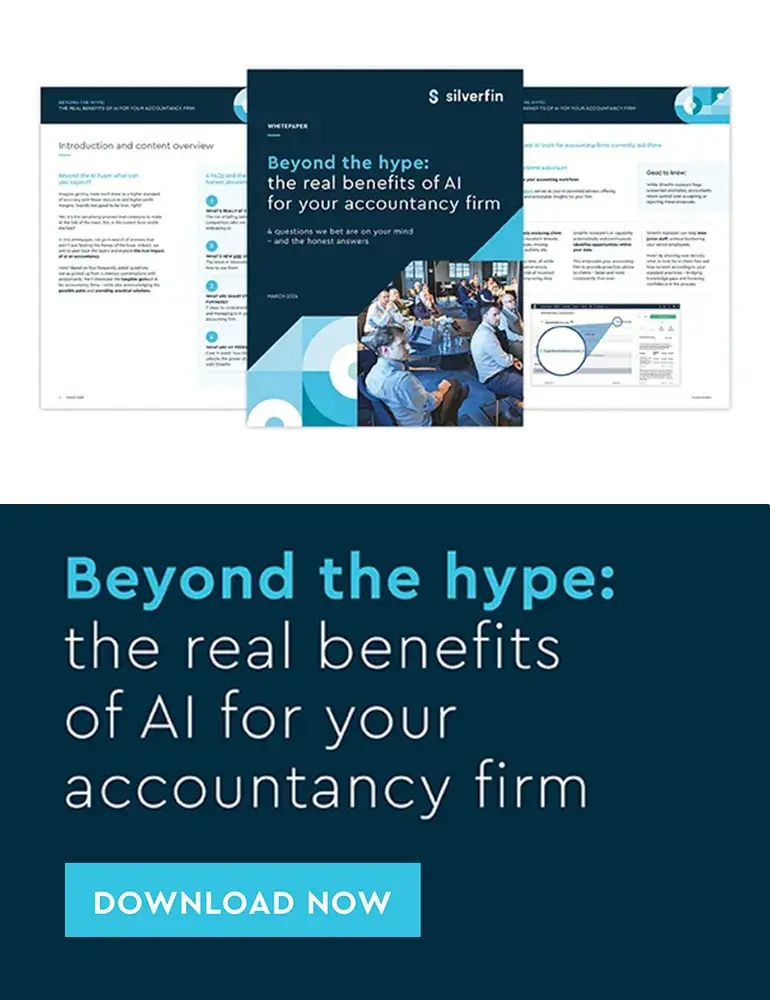The accounting profession is experiencing a major shift. AI and machine learning are no longer just buzzwords; they are essential tools for modern accounting practices.
Consider this: 24% of top-performing client advisory services practices already use AI. This statistic highlights the growing adoption of AI and the competitive edge it provides.
Embracing accounting machine learning can help your firm stay ahead, streamline operations and unlock new growth opportunities.
This article outlines seven steps to help you understand and manage AI in your accounting firm, enabling you to seamlessly integrate AI into your workflows, enhance your team’s capabilities and offer superior service to your clients.
RELATED: How Accounting Intelligence Can Give Your Firm a Competitive Advantage
Smarter Accounting: How AI Automates Tasks
Machine learning in accounting is one of the branches of AI that uses advanced algorithms and data analytics to automate and enhance various accounting tasks.
Unlike traditional software, machine learning systems learn from data, identifying patterns and making decisions with minimal human intervention. This technology goes beyond simple automation, continuously improving accuracy and efficiency over time.
In practical terms, machine learning handles tasks like data entry, invoice processing, fraud detection, and financial forecasting. Imagine an AI system that continually updates balance sheets, flags anomalies, and predicts cashflow trends based on historical data.
Reducing the risk of human error, this intelligence combined with automation frees up valuable time for accountants to focus on strategic activities, such as advisory services and client engagement.
Did you know: By 2024, the global AI in accounting market is forecasted to grow to USD 5.37 billion, achieving a compound annual growth rate (CAGR) of 30.4%.
Machine learning also provides deeper insights by analysing vast amounts of data quickly and accurately. This capability allows accountants to identify trends, detect outliers and make more informed decisions. For example, AI can highlight unusual transactions that might indicate fraud or flag when thresholds such as VAT are passed.
With a Sage Practice of Now survey proving that customer expectations are increasing, integrating machine learning into workflows is becoming essential for delivering better quality customer service and staying competitive.
The 7 Steps to Understanding & Managing AI in Accounting
Implementing AI and machine learning in your accounting firm can seem daunting, but breaking it down into manageable steps makes the process smoother.
Here are seven essential steps to help you effectively integrate AI into your workflows.
Step 1: Get Your Accounting Firm and Staff Ready
Getting ready for machine learning means more than just setting up new software. The best way to start the process is by educating your team about what AI can do for your accounting firm.
There will understandably be concerns about how AI might take over, so highlight that AI is a tool to boost efficiency, not a replacement for human expertise.
It’s also important to encourage a culture of adaptability and continuous learning. Involve your staff in decisions about AI adoption, addressing their concerns and valuing their input. Provide training and resources to help them gain the necessary skills.
Creating a collaborative environment where team members feel comfortable sharing their thoughts and best practices regarding AI integration is the best way to get everyone into an accepting state of mind.
RELATED: How to create an AI policy for your accounting firm
Step 2: Evaluate Your Current Processes and Readiness
Understanding your current workflows is crucial before implementing AI. It’s part of a good adoption strategy to spend time identifying repetitive tasks that consume your team’s time and finding the bottlenecks that hinder productivity.
Consider areas where AI and automation can reduce stress and workload. Use historical data to find patterns and relationships that can help train AI systems. This assessment will help you pinpoint where AI can make the most impact, ensuring a smoother transition.
RELATED: Why AI Accounting Software Is Better Than Excel for Modern Firms
Step 3: Ensure Your Data is Ready
AI relies on clean, structured data to function effectively. Ensure your data is up-to-date and accessible across the firm.
Use cloud syncs and AI enrichment to standardise and organise your data. This step involves integrating data from various bookkeeping software and ensuring it is in a uniform format.
RELATED: Getting your data in the right place for AI, with AI
Step 4: Identify and Manage Potential Risks
The process of implementing AI comes with certain risks, such as data security and algorithmic bias. Therefore, a robust risk management plan is vital for successful AI integration.
Start by identifying potential risks and developing strategies to mitigate them. For example, use secure, trusted AI technologies that comply with data protection regulations and are ISO27001 certified.
Ensure transparency in AI processes and maintain human oversight for critical decisions. Regularly audit AI systems to manage bias and ensure they function correctly.
Step 5: Collaborate with Innovative Technology Partners
Partnering with the right technology providers can simplify your AI journey. Look for partners with a proven track record, scalability, and a shared vision.
These partners can offer expertise, support, and resources to help you implement AI solutions quickly and effectively. Collaborating with technology innovators also ensures you stay at the forefront of AI advancements.
Step 6: Define the Measurement of Success
It’s important to decide what success looks like in your accounting firm. With this information, you can set clear metrics and KPIs to measure the success of your AI initiatives.
The areas that need tracking are often related to accuracy, customer satisfaction, time savings, and profitability.
Establish a baseline for each KPI to monitor progress. Regularly review these metrics to ensure AI aligns with your firm’s goals and drives continuous improvement.
Step 7: Collaborate with Clients, Stakeholders, and Partners
Transparent communication with stakeholders is key to successful AI adoption.
Clearly explain your AI goals and address any concerns. It’s also a good idea to have some data ready to show how AI improves your services and processes.
By involving your clients and partners in the AI journey, you are inviting collaboration, which is a highly effective way to build trust and boost communication.
How Silverfin Assistant Drives Better Efficiency and Accuracy
Silverfin Assistant is a powerful AI tool designed to streamline your accounting processes.
By continuously analysing client files, it detects unusual balances, missing transactions, and outliers. This saves hours of manual checking, improving both accuracy and client service by flagging potential issues early.
Russell Frayne, Director of Transformation at Gravita, shares his experience: “We were keen to be early adopters of Silverfin Assistant; now we’re also strong advocates.”
He adds, “Silverfin Assistant sits right at the heart of the Silverfin platform, so that’s reassuring. The software had already gone through due diligence and procurement processes when we adopted it into the business. So, we already knew our data would be safe.”
With its seamless integration into the Silverfin platform, the Assistant ensures your data remains secure while providing valuable insights.
By leveraging accounting machine learning through this intelligent tool, your firm can boost productivity and meet the growing needs of clients.
Unlocking Potential with Accounting Machine Learning Tools
So, are you ready to transform your accounting firm with AI and machine learning? Using such innovative solutions can position your firm as a leader in the industry.
By staying proactive and committed to continuous improvement, your accounting firm can use AI to stay competitive, enhance client satisfaction, and achieve new levels of productivity and profitability.
Tools like Silverfin Assistant showcase this very power, with its AI-powered data analysis driving efficiency and accuracy in everyday operations.
It’s a fact: AI and accounting machine learning are not just trends but essential tools for future-proofing your accounting firm. The time to get on board with these tools is now.
Ready to see the impact of AI on your accounting processes? Book an introductory call today and discover how Silverfin Assistant can transform your firm’s efficiency and accuracy?
















